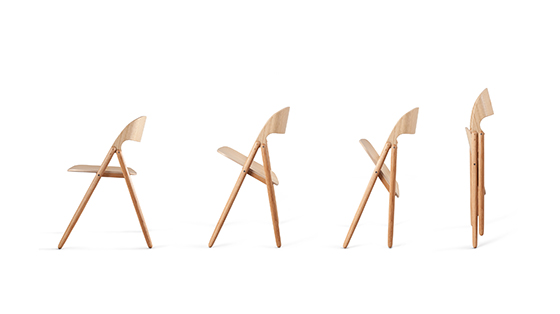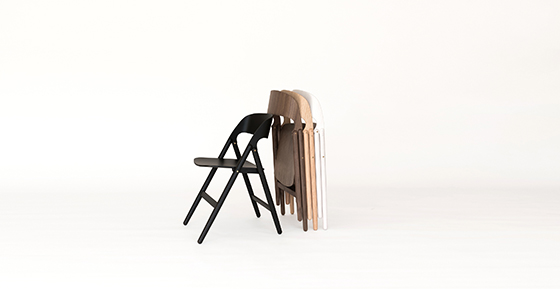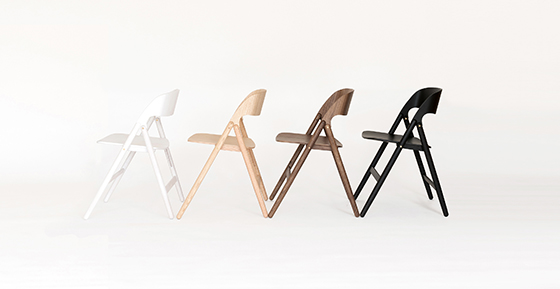Utilitarian Rigour: David Irwin’s Narin Chair for Case
Texto por Case
Reino Unido
31.08.16
Designers are often excited about designing a chair, yet few design a chair for the modern way of living – a folding chair. Space is becoming a premium commodity so furniture, which can provide us with more space, is in the front of our minds. Recognising a shortage of attractively priced, wooden folding chairs, Irwin addresses this with ultra-fine attention to detail, focusing on elegant silhouettes and soft lines.
"I set out to design a folding chair that didn't comprise on aesthetics or comfort in order for it to fold. In a way I wanted to change our preconceptions of what a folding chair is – a piece of furniture you would be proud to have on display at any time and not the emergency chair that only comes out of the cupboard on occasions” explains David Irwin.
Folding chairs have typically been inexpensive objects used temporarily when those extra guests arrive, or design classics commanding a premium price tag. David Irwin wanted to create an object that was both beautiful folded, or in use so it can delicately lean in the corner of a room.
As house sizes are getting smaller in many countries, customers are focused on having less in their homes and create room for more important things. Graham Hill wrote for the New York Times in 2013 “we live in a world of surfeit stuff, of big-box stores and 24-hour online shopping opportunities. Members of every socioeconomic bracket can and do deluge themselves with products.” Turning our attention to the importance of well-designed good-quality objects is key to living in smaller homes.
In London, there is a new minimum space standard as part of the London Plan. For new flats the minimum standards are 37m2 for one person. This makes it essential for homeowners to buy better that lasts longer and looks beautiful. With the Narin Chair, Irwin has created one object customers will be happy to have on display when not in use.
“David Irwin has always been a designer on our radar who consistently offers well considered design which is as functional as it is beautiful” says Paul Newman of Case. “Our shared desire to explore manufacturing techniques and push material capabilities brings a natural energy to the development. We are excited to bring a beautiful wooden folding chair to the market that looks as good folded as it does open.”
Inspired by the constantly adapting nature of modern workshops, the lightweight Narin folding chair is both easy to collapse and move around, and can be stored in condensed stacks that occupy minimal space. The solid wood frame is robust enough for use in meeting, conference and waiting rooms.
The elegant design of the Narin chair features a smooth sweeping transition from the turned oak legs into the formed backrest, which also doubles as the mount for the pivot from where the back leg rotates. The seat and back are formed from layered birch ply with an oil-finished oak veneer and stainless steel fixings. The fixings contained on the underside of the chair slide along the grooves within the back legs to present a graceful silhouette with clean flowing lines, which looks as good folded away for storage as it does when open and in use.
Irwin explains “I wanted the collapsible element to be a functional addition to an already beautiful chair as opposed to compromising these factors in order to fold it. It was a challenge to achieve a really comfortable seating position whilst also delivering the utilitarian rigour required of a folding chair but I think Narin delivers on both these fronts."
The Narin’s smooth sweeping transition is accentuated through the solid timber turned legs into the formed backrest, which also doubles as the pivot from where the back legs rotates. The seat and back are formed from a high-grade birch ply with oak or walnut veneer while the rest of the chair is solid wood. This is either finished with a natural clear lacquer or stained dark or white beforehand.
David Irwin is a British industrial designer driven by a desire to assign purpose to both traditional and contemporary manufacturing processes.
Focused on material exploration, David Irwin combines strong conceptual thinking with a fundamental usefulness, resulting in simple, innovative and refined solutions to aid our daily lives.
“I suppose the satisfaction I get from seeing an idea make the jump from paper to reality is the reason I became a designer” says Irwin.
Awarded the Homes & Gardens magazine’s Young Designer of the Year 2013, he has been applauded for his simple and modern designs, which are fundamentally useful and uncluttered objects designed to stand the test of time.







